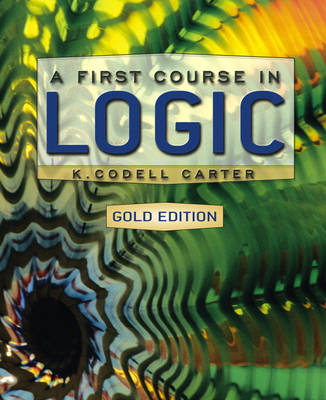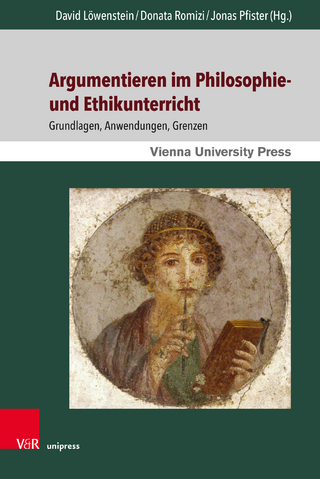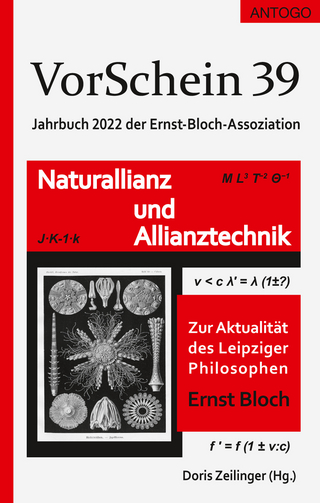
A First Course in Logic, Gold Edition
Pearson (Verlag)
978-0-321-27732-9 (ISBN)
- Titel ist leider vergriffen;
keine Neuauflage - Artikel merken
K. Codell Carter believes that teaching should be a conversation between friends, and he wrote A First Course in Logic to reflect this ideal. He has taught more than four thousand beginning logic students throughout his teaching career. Carter is currently a professor at Brigham Young University where, in addition to logic courses, he teaches courses on the history of philosophy (especially Kant and Marx) along with freshman and junior level writing courses. He received his Bachelor of Science in Mathematics and his Masters of Arts in Philosophy from the University of Utah and holds a Ph.D. in Philosophy from Cornell University. His publications include works on 19th and 20th Century medicine, and when not thinking about ways to make the study of logic more relevant to students' lives, he enjoys backpacking, gardening, fly fishing, old books, and mountain lakes above the timberline.
This tentative table of contents is for early review purposes; the final contents may not include all of the selections listed here. Each chapter contains: exercises, LSAT questions, “What Will I Learn in This Chapter?;” “What Have I Learned in This Chapter?;” “How Can I Apply What I Have Learned in This Chapter?;” and “Where Do I Go from Here?”
1. Basic Concepts of Logic.
Arguments.
The Historical Roots of Logic.
Induction and Deduction.
Validity and Soundness.
Logical Strength and Cogency.
Refutation.
Proof.
2. Logic and Language.
Use and Mention.
The Uses of Language.
Kinds of Definitions.
Ways of Defining.
Rules for Lexical Definitions.
Arguments in Context.
Fallacies.
3. Syllogistic Logic.
Aristotelian Logic.
Diagramming and Symbolizing Categorical Statements.
Categorical Equivalences.
Syllogisms.
Using Venn Diagrams to Refute Invalid Syllogisms.
Using Canons to Test Syllogisms for Invalidity.
Syllogistic Fallacies.
Enthymemes and Sorites.
Proofs of Valid Syllogisms.
The Limits of Syllogistic Logic.
4. Truth-functional Logic: Symbolization and Refutation.
Stoic Logic.
Symbolizing Truth-functional Arguments.
Truth Tables.
Classifying and Comparing Statements.
Implication and Equivalence.
Refuting Invalid Truth-functional Arguments.
Truth-functional Fallacies.
The Sheffer Arrow.
5. Truth-functional Logic: Proofs
Statement-Forms and Their Instances.
Modus Ponens and Rules for Conjunctions, Disjunctions and Biconditionals.
Conditional Proof.
Indirect Proof.
Shortcut Rules.
Shortcut Rules, Continued.
Strategies and Tactics.
Other Uses for Truth-functional Proofs.
The Nature of Truth-functional Proofs.
6. Quantificational Logic.
Frege's Project.
Quantificational Notation: Monadic Predicates.
Quantificational Notation: Polyadic Predicates.
Quantificational Proofs.
The Nature of Quantificational Logic.
Properties of Relations and Second-Order Logic.
The Outcome of Frege's Project.
7. Inductive Logic.
Inductive Arguments.
Appeal to Authority.
Argument by Analogy.
The Strength of Inductive Arguments.
Hypothesis and Confirmation.
Causal Reasoning.
Argument by Generalization.
Samples.
Probabilistic Reasoning.
Solutions to Starred Exercises.
Glossary/Index.
| Erscheint lt. Verlag | 14.7.2004 |
|---|---|
| Sprache | englisch |
| Maße | 185 x 230 mm |
| Gewicht | 916 g |
| Themenwelt | Geisteswissenschaften ► Philosophie ► Logik |
| ISBN-10 | 0-321-27732-5 / 0321277325 |
| ISBN-13 | 978-0-321-27732-9 / 9780321277329 |
| Zustand | Neuware |
| Haben Sie eine Frage zum Produkt? |
aus dem Bereich


